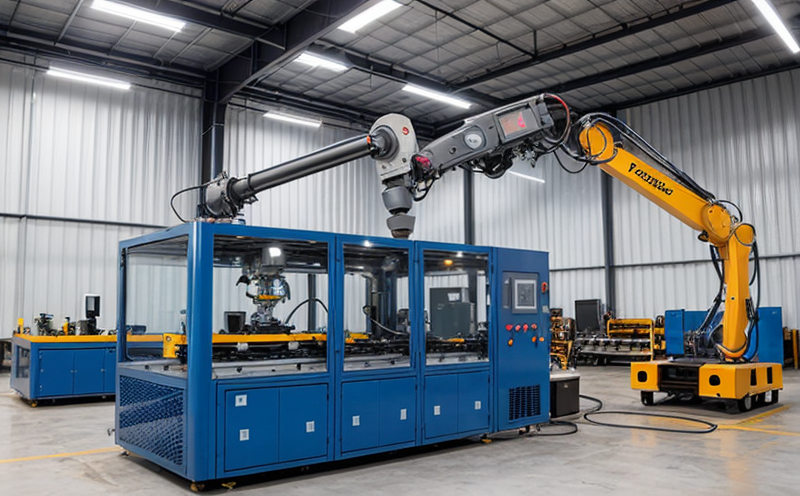ISO 17305 Electromagnetic Compatibility Testing of Robots
The International Organization for Standardization (ISO) provides a robust framework to ensure that products and systems, including industrial robots, meet electromagnetic compatibility (EMC) standards. ISO 17305 specifically addresses the EMC testing requirements for industrial robots used in automation systems.
Electromagnetic Compatibility testing is crucial in industrial manufacturing and processing environments where multiple electronic devices operate together. The aim of these tests is to ensure that equipment operates as intended without causing electromagnetic interference (EMI) or being affected by it. This is particularly important when integrating various robotic systems into a larger factory setup, where robust EMC performance can significantly enhance operational reliability.
Industrial robots are intricate machines with complex electronic and mechanical components. During the design phase of these robots, engineers must consider how their devices will interact within the electromagnetic environment of an industrial facility. By adhering to ISO 17305 standards during development, manufacturers can minimize potential issues in the field.
The testing process involves subjecting the robot to various EMI sources such as motors, power supplies, and other equipment that generate electromagnetic fields. The goal is to verify if the robot can function correctly under these conditions without introducing unwanted interference into its surroundings or being affected by external signals. Compliance with ISO 17305 ensures that robots meet stringent international standards for EMC performance.
Compliance with this standard helps industrial manufacturing facilities achieve several benefits, including enhanced reliability and safety of automated systems, reduced maintenance costs due to fewer failures caused by EMI, improved quality control processes through consistent machine behavior across different environments, and easier integration into existing infrastructure without disrupting operations. Additionally, adhering to these standards enhances the reputation of manufacturers who demonstrate commitment to high-quality products that meet global regulatory requirements.
At Eurolab, we offer comprehensive testing services tailored to ISO 17305 compliance for industrial robots used in automation systems. Our state-of-the-art facilities and experienced professionals ensure accurate and reliable results that enable clients to confidently bring their products to market while meeting all relevant regulations globally.
Applied Standards
The primary standard applicable here is ISO 17305, which specifies the requirements for electromagnetic compatibility tests of industrial robots used in automation systems. This international standard ensures that robotic devices meet specific criteria regarding their susceptibility to and generation of electromagnetic interference.
- ISO 17305: Specifies the test procedures for assessing the electromagnetic compatibility (EMC) performance of industrial robots within an automated manufacturing environment.
- IEC 61800-5: Provides general principles and guidelines for the integration of electromechanical components into industrial automation systems, which supports compliance with ISO standards like 17305.
- EN 55024: Defines limits for conducted and radiated disturbance emissions by equipment intended to be connected to power lines in office environments; although not directly applicable, it provides a benchmark for understanding EMI tolerance levels.
These standards are integral components of our testing protocols at Eurolab. By leveraging these internationally recognized guidelines, we ensure that all tests conducted meet the highest industry standards, providing clients with accurate and reliable results.
Eurolab Advantages
At Eurolab, our commitment to excellence in industrial robotics & automation system testing sets us apart from competitors. Here are some key advantages that make us the preferred choice for organizations seeking ISO 17305 EMC compliance:
- State-of-the-Art Facilities: Our advanced laboratories feature cutting-edge equipment designed specifically for conducting rigorous EMC tests on industrial robots.
- Experienced Professionals: Our team comprises highly qualified engineers with extensive experience in both robotic systems and electromagnetic compatibility testing.
- Comprehensive Testing Services: Beyond just compliance verification, Eurolab offers a full suite of services aimed at helping clients optimize their product performance before certification.
- Global Recognition: Our expertise is recognized worldwide, ensuring that your products are tested against the most stringent international standards.
- Fast Turnaround Times: We understand how critical timely delivery can be for businesses. Our streamlined processes allow us to deliver results quickly without compromising on quality.
- Detailed Reporting: Every test comes with a detailed report outlining all aspects of the evaluation, including areas where improvements could be made.
- Custom Solutions: Whether you need basic compliance testing or more complex evaluations tailored to specific needs, our flexible approach allows us to provide solutions that suit your unique requirements.
Choose Eurolab for all your industrial robotics & automation system EMC testing needs. With us, you can rest assured knowing that every step of the process is handled with precision and care, ensuring that your products not only comply but exceed expectations in terms of electromagnetic compatibility performance.
Use Cases and Application Examples
The application of ISO 17305 EMC testing for industrial robots spans across numerous industries, including automotive manufacturing, electronics assembly, aerospace engineering, and more. Here are some practical examples:
- Automotive Manufacturing: Ensuring that robotic arms used in vehicle assembly lines do not interfere with other sensitive electronic systems like anti-lock braking sensors.
- Electronics Assembly: Verifying the robustness of automated soldering machines against electromagnetic interference during production processes to maintain product quality and reliability.
- Aerospace Engineering: Testing robotic arms used in space exploration missions for their ability to withstand harsh environmental conditions while maintaining precise movements.
- Pharmaceutical Manufacturing: Guaranteeing that automated packaging machines operate seamlessly without introducing any electromagnetic interference into the surrounding environment, which could affect drug efficacy or safety.
- Food Processing Industries: Ensuring that robotic arms handling perishable goods are not affected by nearby electronic devices like refrigeration units or conveyors belts.
- Mining Operations: Confirming that remote-controlled mining equipment functions correctly despite being exposed to high levels of electromagnetic noise generated by large machinery.
These examples illustrate the versatility and importance of ISO 17305 EMC testing in ensuring reliable operation across diverse industrial sectors. By adhering to these standards, manufacturers can enhance their product performance, improve customer satisfaction, and gain a competitive edge in an increasingly interconnected world.





